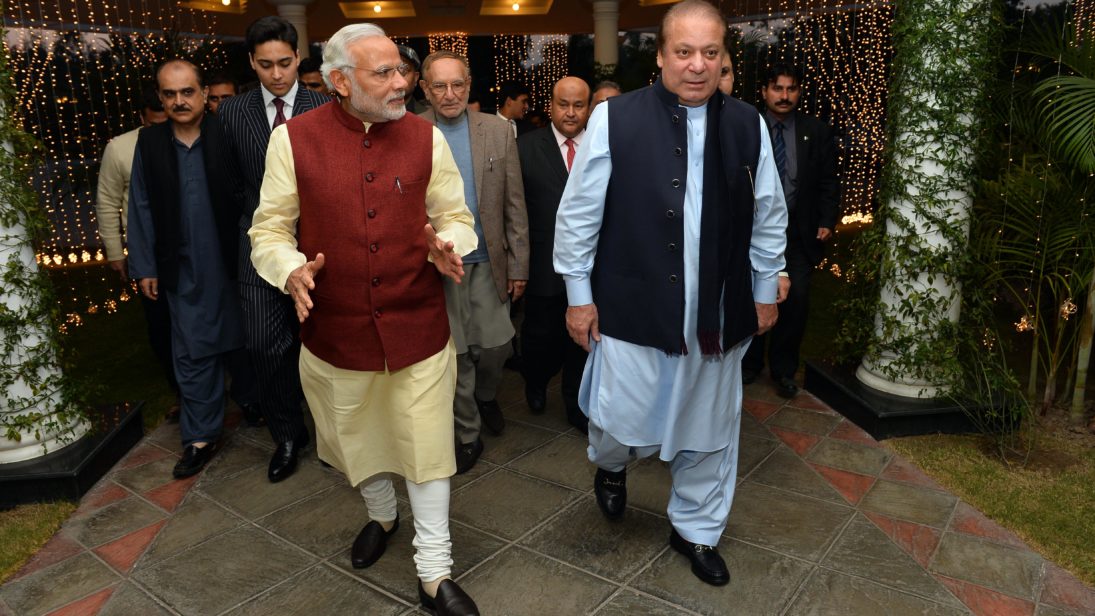
There has been a buzz surrounding India-Pakistan relations in recent weeks. The decision of the Narendra Modi government to invite all heads of governments of all SAARC countries and Mauritius to the swearing-in ceremony was seen by many as a positive step. It was as if the incoming Prime Minister had read the words “All the world’s a stage,” in Shakespeare’s As You Like It and had taken it to heart. Many in India felt that by extending the invitation, India had seized the initiative rather than responding to an existing situation, crisis.
Given that Indians continue to fixate on Pakistan, most of the media coverage and discussions focused on Pakistan, overshadowing the fact that heads of eight other governments were also attending the swearing-in ceremony. However, the fact that the Pakistani Prime Minister Nawaz Sharif decided to come to India in spite of the strong domestic opposition is indicative of the importance both leaders place on improving India-Pakistan relations. Having made a great beginning, Prime Ministers Sharif and Modi will now have to walk the talk.
While I was following these developments, two questions kept coming back to my mind. First, Why should India continue to engage Pakistan and what does it seek to gain from such an engagement. Second, who should India engage with in Pakistan?
Why and for what end should India continue to engage Pakistan?
The first question – frequently posed by the hawkish lot – stems out of a general disillusionment in India about the lack of any success in normalising relations with Pakistan and resolving bilateral issues. There has been little change in Pakistan’s policy as it pertains to India. Therefore, is there any need to invest significant political capital on improving its relations with Pakistan. More importantly, what does India seek to achieve out of such engagement?
Before you dismiss this as some jingoistic ranting and stop reading, just bear with me for a moment…
India is clocking a decent rate of growth despite the recent hiccups. We have largely been successful in tackling the militancy problem in Jammu and Kashmir and the insurgency in the North Eastern states. Pakistan is staring down a cliff when it comes to its internal security situation. Also, it is facing enormous challenges on the economic and energy front.
Despite all the commonalities the two countries share in terms of history, language, culture, food etc, the differences could not have been starker. To use an analogy, it is as if India is driving away and Pakistan is receding in the rear-view mirror.
In October 2013, while discussing India-Pakistan relations at a Young Scholars Workshop organised by Carnegie Endowment for International Peace and Stimson Center jointly with the Observer Research Foundation, I had made use of the above analogy. Dr. George Perkovich who was moderating the discussion responded to this with a comment which I felt captured the reality of India-Pakistan relations. He agreed that India is doing better economically and the security situation has improved over the past couple of years. However, went on to state that even if Pakistan might be receding in the rear view mirror, India and Pakistan are neighbours and when we (India) return home, Pakistan will be there waiting for us.
Such a sentiment was also expressed by the former Indian Prime Minister Manmohan Singh. By reaching out to Nawaz Sharif, the Modi government has in essence, signalled its thinking on the issue. India and Pakistan (as is the case with India’s other neighbours) are bound by geography (among other things) and we cannot avoid engaging each other.
Arun Vishwanathan is Assistant Professor, International Strategic and Security Studies Programme, National Institute of Advanced Studies, Bangalore. He can be reached via email at arun_summerhill[at]yahoo[dot]com. Arun tweets @ArunVish_
***